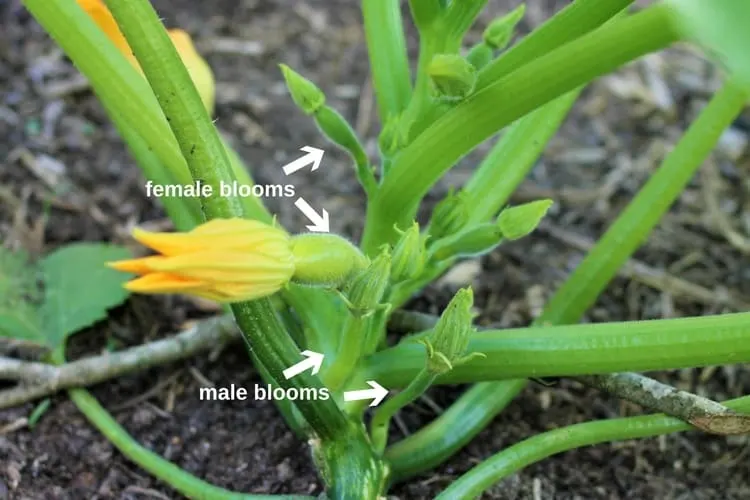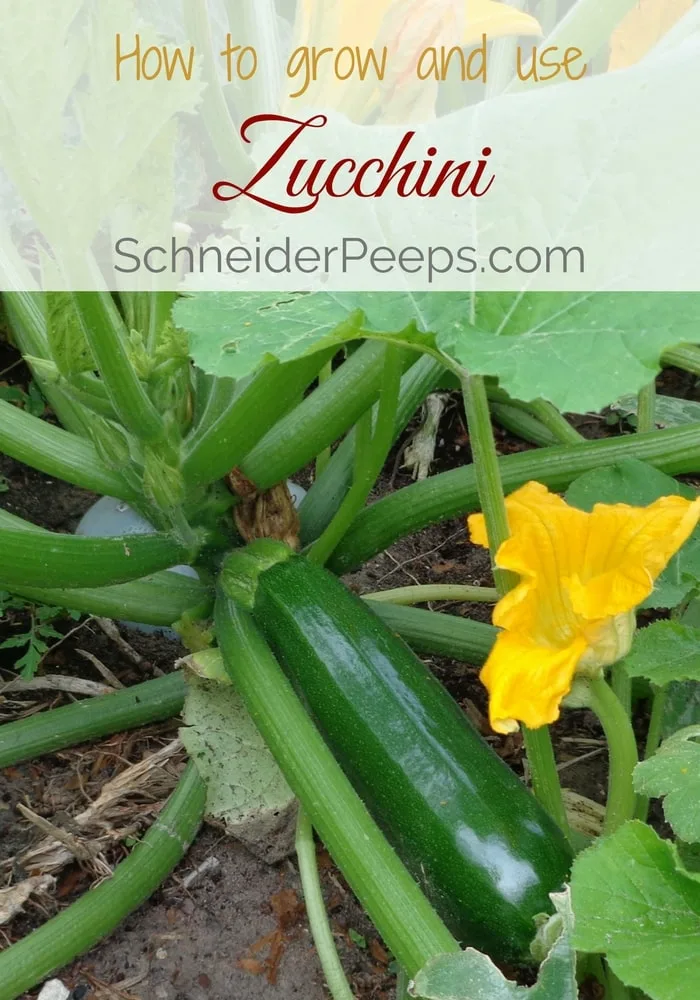Sometimes zucchini gets a bad wrap, but if you’re serious about feeding your family from your garden then growing zucchini is great way to do that. Unlike winter squash that will produce just a few squash per vine, zucchini will produce many squash per plant.
There are three main types of summer squash; zucchini, yellow squash (sometimes called cork neck), and white (or patty pan) squash, but they are all grown the same. So the things that apply to zucchini will apply to the other summer squash.

Growing Zucchini
- Squash do just fine direct seeding in the garden.
- Plant in hills (this helps you know where your seeds are!)
- Plant 3 seeds per hill and then thin if needed. (If you make your hills large enough you might not have to thin)
- Keep well watered, plants will live for a long time with not much water, but either they won’t produce any fruit or the fruit will be hard.
- Squash has male blooms and female blooms. The female blooms have a little fruit at the base of the flower and the male blooms do not. A plant will normally put out male blooms at the beginning and then, a few days later, start putting out female blooms.
- If you’re getting plenty of flowers, both male and female, but fruit isn’t growing and is rotting on the vine, it’s not getting pollinated. You can hand pollinate the female flowers by using a small paint brush and transferring pollen from the male flowers to the female flowers.
- If you plant transplants, plant a few seeds too. That way you’ll have older and younger plants.
- Do not water the leaves, just the soil

Zucchini Pests and Problems
- Vine borer – if all of the sudden your beautiful plant dies, you probably have a vine borer. Look at the base of the plant and see if some little bugs have bored (drilled) their way into the stem. I have heard that you can scrap them out and if you catch them early enough the plant will survive. I have not had much luck doing that. This is part of the reason for planting seeds with transplants. If we have vine borers, we pull the plant and burn it. And we still have our young plants growing.
- Squash bugs and cucumber bugs – you will find these in the flowers. Squish them.
- Squash bugs lay their eggs on the underside of the leaves (they are orangish colored). again – squish them or if you just can’t do it, pull off that leaf and burn it.
- Powdery mildew – is a white mildew that will attack the leaves of squash, melons and cucumbers. It is caused by too much moisture on the leaves and is spread by bugs. We try to cut off infected leaves and burn them. Last year we had a hard time with this and are changing the way we water to hopefully avoid it this in the future.
Harvesting and Preserving Zucchini
Harvest when the fruit is small – no longer than 6-8 inches, this will keep the plants producing. Once you let a fruit mature the production will slow way down.
Summer squash is best eaten fresh, in fact we eat it almost every day during the summer. We use it in stir-fry, lasagna, in pasta salad, and just sauteed as a side.
If you want to store some for later you might try freezing it or dehydrating it. Zucchini can also be pickled or fermented.
You can find information about other fruits and veggies by searching clicking on the In The Garden tab up top or in The Gardening Notebook.


Thersa
Thursday 30th of April 2020
Thanks so so much for the info I learned about the male n female had no idea !
Angi Schneider
Thursday 30th of April 2020
You're welcome!
Frankie
Wednesday 1st of August 2018
Well i learned something for sure today. Male and female and i have lots. So i need to go clean my plant. Thank you so much for sharing!
The Schneiders
Monday 30th of May 2011
You're welcom, Connie. Thanks for visiting.
Connie
Monday 30th of May 2011
Thanks for sharing your experience with growing squash....lots of useful information here.